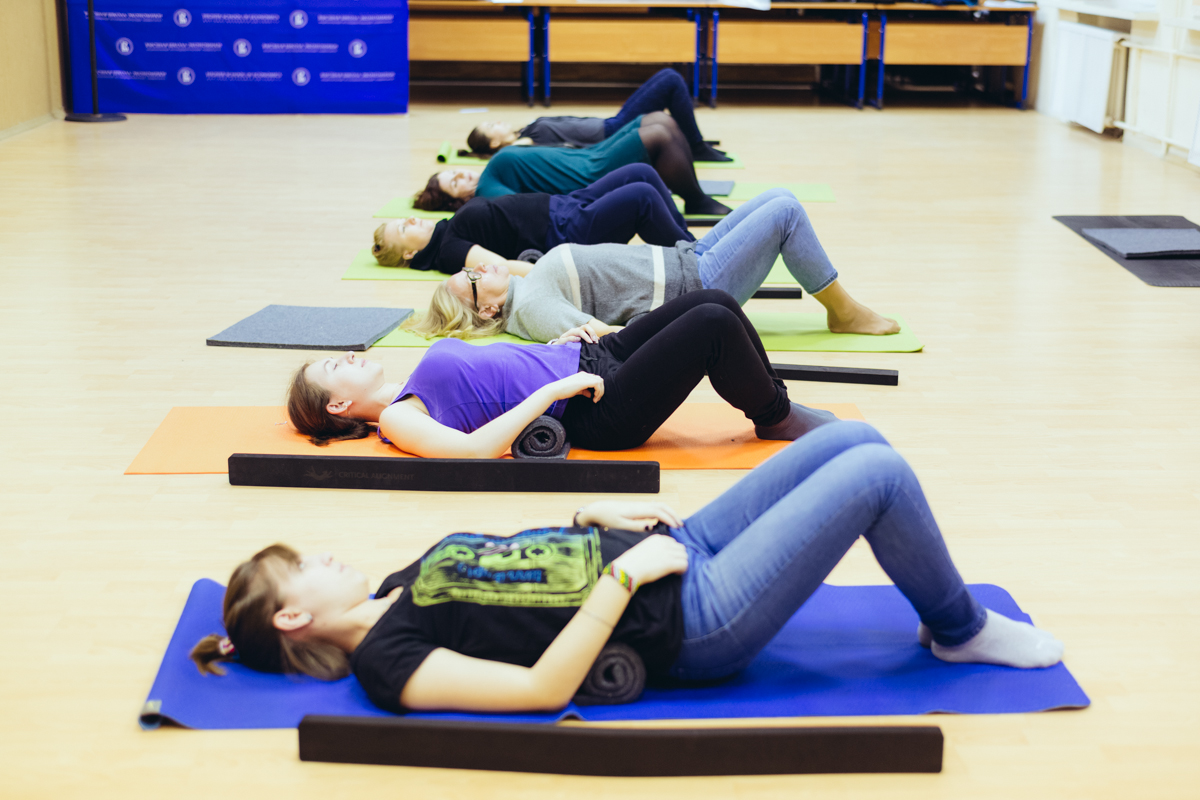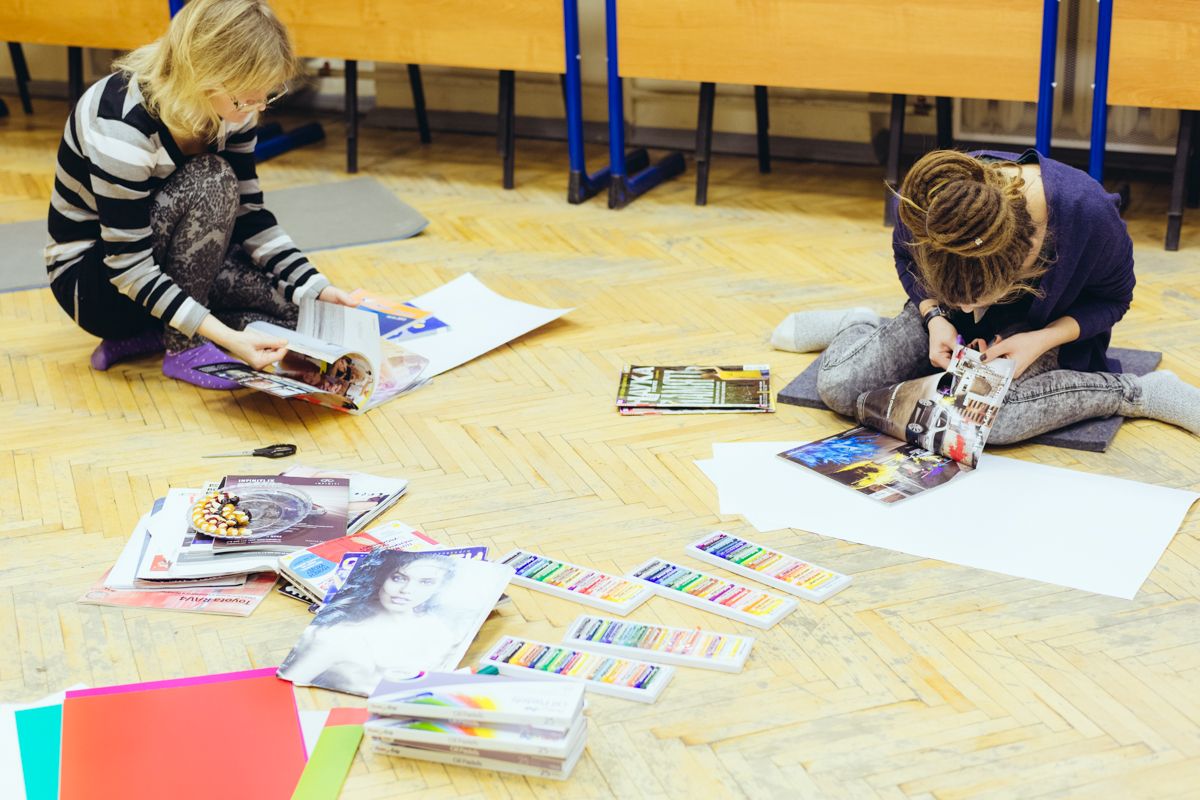Manage Stress through Using Psycho-Dramas, Photo Collages and the 'Life Balance Wheel'
December 21 saw HSE hold its first psychology festival 'Offload FEST', in which specialists from the HSE's Psychological Counseling Center talked about the various different ways of achieving understanding, fighting stress and coping with problems. Below we list some of their very useful advice.
Share your problems,and resolve them using the 'Life Balance Wheel' method – in which you divide your life into separate spheres: health, work, family, etc. As soon as you see your life divided up like this that sense of 'it's all terrible' vanishes, and you start to see where the problems are. Then you can start to solve them.
Free your body.There's a theory that says that how we interact, our behavior and emotions are directly linked to how our bodies feel, and vice versa – all your body's stresses and strains are linked to things we are feeling. We suppress negative emotions but our bodies respond to them, tensing up, and end up almost wooden – but we stop noticing it. Two zones are most vulnerable to this, the neck and shoulders, and the base of our spine. Our shoulders carry the burden of our responsibilities, and the base of our spine takes the weight of all the resentment, anger, and fear. Psychological massage can help locate these knots of physical tension and free them from their emotional cause. At the same time, listening to these feelings can help the body relax. Yoga therapy according to Gert Van Leuween's Critical Alignment theory can also help. If you're interested in finding out more about that, then the HSE's Psychological Counseling Center can help.

Turn your problems into characters. We each have real-time dramas playing out within us. In these 'psycho-dramas' we are involved in an endless discussion with ourselves. Why couldn't I make a decision? Why don't I understand that person? How can I get out of this situation? All these questions have answers, which you can find if you split your reactions to particular themes. Turn your worries into characters, think up a script, and start the show. Visualizing problems can help us find answers to many different questions. Of course, you will not know exactly which faculty to enroll in, but you will understand why you couldn't decide.
'Photograph' your subconscious. With this method, you'll need some like-minded people to help. First, take a bundle of old newspapers and magazines with striking photographs and start doing a photo-collage. This will be the visualization of your wants and needs, reflecting what's going on in your head. Cut out the pictures you're drawn to, and create a general picture of your internal world. Discuss this with your friends, focusing on the feelings that each picture sparks in you, the life-events it's linked to, and listen to their advice and comments. This will help you systematize your thoughts and feelings, and you'll understand how they seem from the outside.

Watch a film, to understand yourself. Film has healing powers, if you don't just watch it with a bucket of popcorn, but use it to try to help you through your problems. Think of your problem, and watch the film as if you're in it. How would you act? What could change, if you were there instead of the lead character? Discuss the film with your friends, and explain the character's actions from your own point of view – and you'll get to know yourself better.
Look into the future. Look back at 2014, it's brightest moments and achievements. Then imagine you're already looking back at 2015, and remembering what you were able to achieve. Think about each sphere of life separately: health, career, finances, relationships, hobbies. This will help you build a clear plan for the next year, and to understand how to acheive your goals.
See also:
Workaholism Helps Young Narcissists Boost New Venture Performance
An international team of researchers including Professor Galina Shirokova, Director of the Strategic Entrepreneurship Centre at HSE University in St Petersburg, and her students Nailya Galieva and Diana Doktorova, examined the impact of narcissism on young entrepreneurs' success. The authors have demonstrated that a company founder's workaholism can amplify the influence of narcissism on a new venture's performance.
Plurilingualism Compensates for Low Extraversion in Nurturing Creative Skills
Researchers at the HSE Laboratory for Linguistic, Intercultural, and Creative Competencies have examined the role of the Big Five personality traits in moderating the development of creativity among individuals who use multiple languages and have intercultural experiences. It has been found that acquiring multiple languages and engaging with diverse cultures can enhance an individual's creativity and compensate for some deficiencies in communicative abilities. That said, language practices are likely to foster creativity only in mentally stable individuals. The paper has been published in the International Journal of Bilingual Education and Bilingualism.
Attainment of Happiness in Psychologically Mature Individuals Linked to Pursuit of Meaning
Austrian psychiatrist Viktor Frankl believed that the quest for meaning constitutes a fundamental and intrinsic motivation for all human beings. Some other authors suggest that the need for meaning or purpose only emerges at higher levels of personality development. According to a team of psychologists from HSE and the University of Paris Nanterre, individuals who have achieved higher levels of ego development are inclined to relinquish hedonistic motives in favour of cultivating mindfulness and embarking on a quest for meaning. These findings have been published in Frontiers in Psychology.
Married Men Less Prone to Workplace Burnout
Greater marital satisfaction lowers the risk of professional burnout, with this correlation being more pronounced among men than women. This is a conclusion made by HSE psychologists after conducting a study on the effect of social interactions on workplace burnout on a sample of 203 employees from several Russian companies. According to the researchers, gaining a better understanding of the specific aspects of burnout experienced by individuals makes it possible to address this syndrome more effectively. The paper has been published in Organizational Psychology.
HSE Psychologists Propose New Approach to Building Soft Skills
Researchers at HSE's School of Psychology have used the findings of studies into creativity and multilingualism to develop 'Plurilingual Intercultural Creative Keys’ (PICK), a new programme which integrates both aspects into the teaching and learning process. The study results have been published in Psychology. Journal of the Higher School of Economics.
Card File: Plurilingual Creativity
Fluency in foreign languages has multiple advantages in terms of cognitive abilities, communication skills, cultural awareness, and career advancement. But can bilingualism and plurilingualism (knowledge of multiple languages and related cultural contexts) contribute to creative thinking and one's ability to generate new ideas? Studies have shown that linguistic, intercultural and creative competencies are interrelated, and their synergy can give rise to plurilingual creativity. The following overview is based on several papers by Anatoly Kharkhurin, Director of the HSE Laboratory for Linguistic, Intercultural and Creative Competencies.
Readers Found to Rely on Word Spelling Rather Than Sound in Reading
Skilled readers are known to extract information not only from the word they are looking at but from the one directly following it. This phenomenon is called pre-processing. Researchers from the HSE Centre for Language and Brain analysed the eye movements of primary school children and adults during silent reading and found both groups to rely on orthographic, rather than phonological, information in pre-processing an upcoming word. The study has been published in the Journal of Experimental Child Psychology.
Psychological Intervention Reduced Stress during COVID Lockdown
Resilience and well-being in difficult times can be developed via online interventions in the workplace. An international team of researchers from France, the UK, and Russia (with the participation of researchers from the HSE International Laboratory of Positive Psychology of Personality and Motivation) studied the effectiveness of SPARK Resilience, a programme for developing resilience, at the beginning of the COVID-19 pandemic. The results of the study were published in the PLOS One journal.
Light Breezes Improve Moods of Social Media Users
Sergey Smetanin, Research Fellow of the HSE Graduate School of Business, conducted a large-scale analysis to examine the impact of weather conditions on the sentiments expressed by users of the Odnoklassniki (OK) social network. The findings have been published in PeerJ Computer Science. This is the first study of its kind in Russia.
HSE Psychologists Examine Baby Duck Syndrome in Digital Interface Users
Researchers of the HSE Laboratory for Cognitive Psychology of Digital Interfaces Nadezhda Glebko and Elena Gorbunova have examined the so-called ‘Baby Duck Syndrome’—the tendency among digital product users to prefer the the old version of an interface over a new one. The authors compare this phenomenon to similar cognitive biases such as the mere-exposure effect, the endowment effect, and the status quo bias. Their findings are published in Psikhologicheskie Issledovaniya [Psychological Studies].


